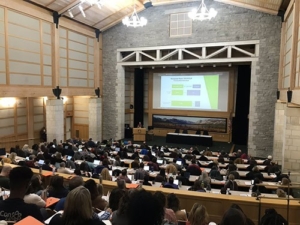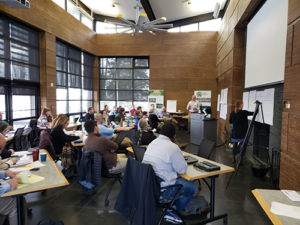NOAA Chesapeake Bay Office Winter 2020 Update
Chesapeake Bay Environmental Literacy Forum Highlights MWEEs
 The Chesapeake Bay Program’s Environmental Literacy Forum brought together roughly 200 educators and state education officials to focus on implementing Meaningful Watershed Educational Experiences (MWEEs) at the Environmental Literacy Forum, January 22-23, at the National Conservation Training Center in Shepherdstown, WV. MWEEs are investigative or experimental projects that engage students in thinking critically about the Chesapeake Bay watershed—and are a best practice for fostering environmental literacy. The Forum focused on how educators can serve as MWEE ambassadors to help others develop MWEEs at the classroom and school district levels. Participants discussed and developed strategies to address gaps and opportunities in state and local environmental literacy efforts. Staff from the NOAA Chesapeake Bay Office’s environmental literacy team played major parts in planning the Forum and bringing it to fruition, in their roles on the Chesapeake Bay Program’s Education Workgroup.
The Chesapeake Bay Program’s Environmental Literacy Forum brought together roughly 200 educators and state education officials to focus on implementing Meaningful Watershed Educational Experiences (MWEEs) at the Environmental Literacy Forum, January 22-23, at the National Conservation Training Center in Shepherdstown, WV. MWEEs are investigative or experimental projects that engage students in thinking critically about the Chesapeake Bay watershed—and are a best practice for fostering environmental literacy. The Forum focused on how educators can serve as MWEE ambassadors to help others develop MWEEs at the classroom and school district levels. Participants discussed and developed strategies to address gaps and opportunities in state and local environmental literacy efforts. Staff from the NOAA Chesapeake Bay Office’s environmental literacy team played major parts in planning the Forum and bringing it to fruition, in their roles on the Chesapeake Bay Program’s Education Workgroup.
Sustainable Fisheries GIT Holds Biannual Meeting
The Chesapeake Bay Program’s Sustainable Fisheries Goal Implementation Team (GIT) held its biannual meeting at the Virginia Institute of Marine Science on January 7 and 8. Sessions focused on oysters, with topics including restoration progress, new research supporting restoration, ecosystem services of restored reefs, intersections with water-quality issues, nearshore habitats, and ecosystem changes affecting oysters. While the Executive Committee of the Sustainable Fisheries GIT meets monthly, the full team meets in person twice each year to enable deep dives on topics of relevance to Chesapeake Bay Fisheries. The Sustainable Fisheries GIT is chaired by NOAA Chesapeake Bay Office Director Sean Corson.
Workshop Focuses on Invasive Catfish in the Chesapeake Bay
 The Chesapeake Bay Program’s Invasive Catfish Workgroup–part of the Sustainable Fisheries Goal Implementation Team–held a workshop January 29-30 at Virginia Commonwealth University’s Rice Rivers Center to bring stakeholders together to discuss the latest science on these fish and to explore options to manage them in a way that balances ecological and economic interests. Participants included representatives from recreational and commercial fisheries, seafood processors, marketers, U.S. Department of Agriculture (which manages inspection process), conservation groups, state resource managers, U.S. Geological Survey (starting research in the Patuxent River on blue catfish). They heard updates from scientists focusing on catfish (featuring updates since the 2017 symposium) and focused on coming up with collaborative strategies regarding these fish. While blue catfish are a valued recreational fishery, they make up a large portion of the biomass in many Bay rivers, where they eat everything from grass to crabs. There is also a growing commercial fishery but no fishery management plans.
The Chesapeake Bay Program’s Invasive Catfish Workgroup–part of the Sustainable Fisheries Goal Implementation Team–held a workshop January 29-30 at Virginia Commonwealth University’s Rice Rivers Center to bring stakeholders together to discuss the latest science on these fish and to explore options to manage them in a way that balances ecological and economic interests. Participants included representatives from recreational and commercial fisheries, seafood processors, marketers, U.S. Department of Agriculture (which manages inspection process), conservation groups, state resource managers, U.S. Geological Survey (starting research in the Patuxent River on blue catfish). They heard updates from scientists focusing on catfish (featuring updates since the 2017 symposium) and focused on coming up with collaborative strategies regarding these fish. While blue catfish are a valued recreational fishery, they make up a large portion of the biomass in many Bay rivers, where they eat everything from grass to crabs. There is also a growing commercial fishery but no fishery management plans.
